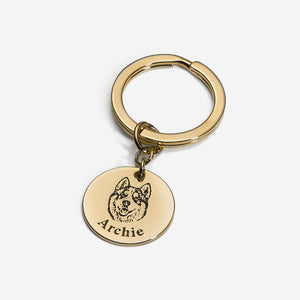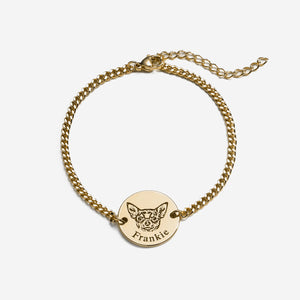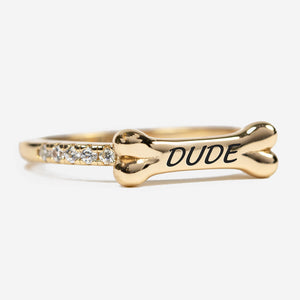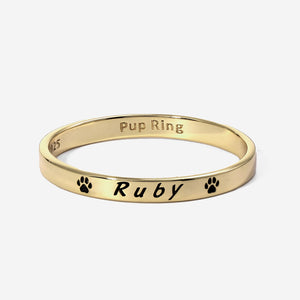With Valentine’s day coming up, you’re probably thinking a little more about love lately. You’ve always known that your dog loves you, and last week you learned 10 ways your dog shows you that they love you. Have you ever wondered… Why? Why does your pup get that extra pep in its step, or bring you its toys, or gaze lovingly into your eyes? Is it just because it knows you bring it food or treats, or is there something more?
While it makes sense that some benevolent being would be nice to be around if they brought you food and toys, your dog isn’t just acting cute in the pursuit of handouts. There is something more to it. Many dogs do truly love their humans! But how do we know that our dogs really love us in the way that we understand the meaning of love? Before we get to the why, here are a couple of interesting things that scientists have learned when it comes to proving our dogs love us!
A dog’s brain reacts in special ways to its owner
Some scientists have decided this is a question that has to be answered. When we ask why our dogs love us, what does that mean? Does your dog just like you because you feed it, or is there something more?
Well, the brains of humans physically react much differently to cues of food than they do to being around loved ones, so this seemed like a good place to start. Scientists took five different scents to test with a dog- its own scent, that of an unfamiliar dog, a familiar dog, an unfamiliar human, and their owner. The way the dog reacted to their owner’s smell was very telling- its brain lit up, specifically the caudate nucleus, which is activated in humans when anticipating something we really love. The dog only reacted this way to the smell of its owner and none of the other samples it was presented with. I would say that’s some pretty strong evidence!
Dogs’ brains activity also sees an increase when their owners are visible. While this isn’t the end-all-be-all proof that dogs love us in the same capacity that humans feel love, it definitely makes a strong case for our four-legged-friends.
Dogs evolved face muscles to express their emotions
Domesticated dogs have evolved over time in countless ways to be better adapted to living with humans. Dogs evolved to be better at performing jobs with humans, and became more adapted to foods that early humans were eating. But becoming a more practical partner wasn’t enough. Domesticated dogs literally evolved the facial muscles necessary to begin expressing emotions better to their human companions. Next time you feel like your dog is smiling at you or giving a certain look, you’ll know that your dog’s own DNA has been adapted to help it do so!
Now that you know a little more about the proof we have of a dog’s ability to love its human, it’s time to get to the point: Here are four of the main reasons why your dog loves you!
1. You both experience an Oxytocin feedback loop
 Do you love spending time with your dog? Does petting and cuddling with it give you a warm fuzzy feeling inside? Well your dog feels the same way! It’s more than just being happy around each other though. The act of petting and holding your dog releases oxytocin, also known as the love hormone, in your brain. Of course this will make you love being around your dog even more.
Do you love spending time with your dog? Does petting and cuddling with it give you a warm fuzzy feeling inside? Well your dog feels the same way! It’s more than just being happy around each other though. The act of petting and holding your dog releases oxytocin, also known as the love hormone, in your brain. Of course this will make you love being around your dog even more.
But what about your pup? Well, your dog gets this lovey-dovey chemical release in its brain as well! The mere acts of petting, holding, cuddling, or sometimes even gazing at your dog triggers this chemical release in both of your brains creating a feedback loop that brings you both closer. Since these good feelings cause you to want to hug your dog more, and vice versa, the feelings continue to build and cause a stronger bond over time. Your dog’s very own brain is causing it to love you even more with every snuggle it gets!
Why does this happen? Well, it’s similar to the reaction a mother and her baby have to each other. The ability to form incredibly strong bonds to one another helps ensure that a mother takes extra-special care of her child. A child learns to stay close to its mother for safety and care. Dogs grew over time to bond with its owner in a similar manner. While this is all well and good in its sense of practicality, by participating in this oxytocin loop, the love that our dogs feel for us helps them to have a symbiotic relationship with their owners in a naturally driven behavior that is consistently reinforced automatically.
By the way, your dog’s brain also releases those happy hormones when it’s gazing lovingly into your eyes. Next time you catch yourself in a sweet staring contest with your pup, remember that this is exactly the same feeling your dog gets when you give it a big hug!
2. Your dog grew attached due to early socialization
 When a dog is very young, it is much more impressionable when it comes to socialization. A puppy younger than 6 months old is in that period of time in its life where its experiences will shape the interactions it will have for the rest of its life. During this time, the more people and experiences a puppy can be exposed to, the better off it will be! This can also shape your pup’s preferences when it comes to people- maybe they will develop a preference for being around male humans, or develop a weariness around people with hats.
When a dog is very young, it is much more impressionable when it comes to socialization. A puppy younger than 6 months old is in that period of time in its life where its experiences will shape the interactions it will have for the rest of its life. During this time, the more people and experiences a puppy can be exposed to, the better off it will be! This can also shape your pup’s preferences when it comes to people- maybe they will develop a preference for being around male humans, or develop a weariness around people with hats.If you have been close with your dog ever since they were a puppy, they probably bonded even closer with you specifically! Your dog grew up understanding you as a caregiver, a source of comfort, and a safe person to be around. It will always associate you, as well as some of your traits, with the kinds of people it should love and trust. Your dog loves you because you’re like a parent to them, and will always love you as such.
A dog’s early experiences will definitely influence the types of people it is more likely to bond to. If your dog’s puppyhood involved becoming attached to its male bachelor owner, it is more likely to be more receptive to the attention and affection of other human males. If the pup didn’t grow up seeing people wearing sunglasses, it may have a bit of an aversion to people wearing sunglasses the first few times it runs into those situations. However, if a young dog has a wide range of experiences with lots of different kinds of humans, the specifics of their current (or future) owners may matter a little less.
Of course, if you didn’t have the opportunity to become your dog’s favorite person when they were younger, you can still be an awesome human to them through continued care and positive interactions. Continued socialization is and will always be an important part of your dog’s well-being, and it helps them become comfortable and confident in a wide range of situations. Socialization creates a well-rounded dog. By giving the time and attention needed for some extra socialization with you, your dog will learn to love you even more.
3. You share a common personality with your dog
 Have you ever met a dog and its owner that just seemed to be unusually similar? Maybe they seem so in sync that they even start to act like each other! Well, just like people have personalities, dogs can too! Similarly to how an energetic person may find it easier to bond with other energetic people, a more active dog is more likely to bond with a human who shares a lifestyle full of movement. You may be more likely to go on runs together or play activity-intensive games. The same idea goes for personalities too, like being reserved, stubborn, or even couch potatoes. If your personality is similar to your dog’s, you are both more likely to spend time doing your favorite things together. You will also be more likely to put yourselves in situations where you are both more comfortable. You’ll be spending more time together in general too.
Have you ever met a dog and its owner that just seemed to be unusually similar? Maybe they seem so in sync that they even start to act like each other! Well, just like people have personalities, dogs can too! Similarly to how an energetic person may find it easier to bond with other energetic people, a more active dog is more likely to bond with a human who shares a lifestyle full of movement. You may be more likely to go on runs together or play activity-intensive games. The same idea goes for personalities too, like being reserved, stubborn, or even couch potatoes. If your personality is similar to your dog’s, you are both more likely to spend time doing your favorite things together. You will also be more likely to put yourselves in situations where you are both more comfortable. You’ll be spending more time together in general too.Certain dog breeds are more likely to have specific personalities. Pomeranians are more likely to be couch potatoes. Border Collies and German Shepherds will be more excited to spend time training together due to their naturally high intelligence and curiosity. Huskies tend to be more strong-willed and vocal (seriously I love videos of huskies “arguing” with their owners. It’s unbelievably cute).
Sometimes, a dog’s breed is even associated with the tendency to form a strong bond with just one person. Dogs like Greyhounds, Basenji, Shiba Inus, and Cairn Terriers especially share this tendency. They are likely to be a little more introverted and attached at the hip to their favorite human, and may become stubborn or slow to warm up to someone new.
Of course you don’t have to be a perfect personality match for your dog in order to be loved by your pup. By considering how your dog’s personality matches up against yours, you can make better decisions about your approach to bonding with your pup. It can also give you a bit more patience and understanding if you’re not carbon copies of each other. As long as you recognize your dog’s needs and do your best to meet them, your dog is going to love you even more in return!
4. You show your dog that you care
 Finally, your dog loves you because of all the effort you put into making sure they are cared for and feel loved. Dogs want to be around you more when you do things like play with it, spend extra time together, and go on walks. Being your dog’s primary caregiver means that you are bound to give it more time and attention. Doing activities where your dog is the star of the show are especially effective. Taking the time to work directly with your dog training, improving communication, and teaching new skills will help you bond on an even higher level as you learn to understand each other and work together to accomplish a goal. You can even find a sport that involves working as a team like agility or flyball. As long as you get in that focused, quality time, that bond will help your dog truly love you and the time you spend together.
Finally, your dog loves you because of all the effort you put into making sure they are cared for and feel loved. Dogs want to be around you more when you do things like play with it, spend extra time together, and go on walks. Being your dog’s primary caregiver means that you are bound to give it more time and attention. Doing activities where your dog is the star of the show are especially effective. Taking the time to work directly with your dog training, improving communication, and teaching new skills will help you bond on an even higher level as you learn to understand each other and work together to accomplish a goal. You can even find a sport that involves working as a team like agility or flyball. As long as you get in that focused, quality time, that bond will help your dog truly love you and the time you spend together.When your dog is already forming positive associations with you, it’s easier to get attached. While your dog doesn’t only love you because you feed it, it certainly helps when you do things that teach your dog that being around you means good things happen!
In the big picture though, your dog doesn’t love you as a reward for feeding it. In an evolutionary sense, it’s much more likely that dogs who made stronger emotional bonds with humans were more likely to then be cared for in return. Therefore, a dog’s ability and willingness to love its human comes even before the food. The way that you physically care for your dog’s needs and form positive associations with your presence actually acts more like a reinforcement for the love that your dog already has for you.
What are some ways that you like to show your dog you love them?
 Next week we’ll talk about the best ways you can show your dog you love them! And if you want a way to show off how much you love your dog, check out our Personalized Dog Bone Ring where you can put your pup’s name on a ring for all to see!
Next week we’ll talk about the best ways you can show your dog you love them! And if you want a way to show off how much you love your dog, check out our Personalized Dog Bone Ring where you can put your pup’s name on a ring for all to see!Thanks again for reading! I hope you are staying safe, healthy, and happy, and I look forward to writing for you again next week!







